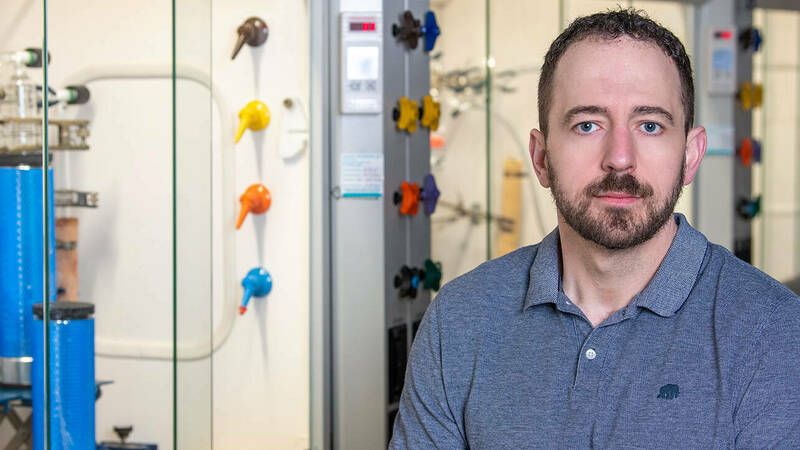
Matthew Webber
Keating-Crawford Collegiate Associate Professor of Engineering; Concurrent Associate Professor
- Office
- 105F McCourtney Hall
Notre Dame, IN 46556 - Phone
- +1 574-631-4246
- mwebber@nd.edu
Research Areas
- Biochemistry
Research Specialties
- Materials
- Medicine
Prospective Graduate Students
Biography
| Year | Title |
|---|---|
| 2022-present | Keating-Crawford Collegiate Associate Professor, Department of Chemical & Biomolecular Engineering, University of Notre Dame |
| 2021-present | Concurrent Associate Professor, Department of Chemistry & Biochemistry, University of Notre Dame |
| 2021-2022 | Associate Professor, Department of Chemical & Biomolecular Engineering, University of Notre Dame |
| 2017-2021 | Concurrent Assistant Professor, Department of Chemistry & Biochemistry, University of Notre Dame |
| 2016-2021 | Assistant Professor, Department of Chemical & Biomolecular Engineering, University of Notre Dame |
| 2012-2016 | NIH NRSA Postdoctoral Fellow, Koch Institute, MIT |
| 2011 | Ph.D. in Biomedical Engineering, Northwestern University |
| 2009 | M.S. in Biomedical Engineering, Northwestern University |
| 2006 | B.S. in Chemical Engineering, University of Notre Dame |
Selected Awards
2023 Owens-Corning Award, Materials Engineering & Science Division, American Institute of Chemical Engineers
2023 Elected to College of Fellows, American Institute of Medical & Biological Engineering
2022 ACS-PMSE Elected Member-at-Large
2020 NSF CAREER Award
2020 ACS-PMSE Young Investigator Award
2019 3M Non-Tenured Faculty Award
2013 NIH Ruth L. Kirschstein National Research Service Award
Research Interests
Using principles based in supramolecular chemistry – that is, “chemistry beyond the molecule” – the Webber Lab is interested in exploiting specific, dynamic interactions between molecules to facilitate improved therapeutics. With this design inspiration, we are modulating the association and self-assembly of oligopeptides in order to create tailored and dynamic matrices for applications in regenerative medicine. We are also using specific, high affinity host-guest macrocycle chemistry to enable precise targeting and transport of drugs and therapeutic agents. Finally, we are generating new classes of recombinant materials using protein-derived affinity motifs to promote three-dimensional structures. In sum, our work aims to leverage the engineering of supramolecular motifs to improve the practice of medicine.
Selected Publications
- Ye, Z.; Chi, T.; Evans, C. J.; Liu, D. P.; Addonizio, C. J.; Su, B.; Pramudya, I.; Xiang, Y. H.; Roeder, R. K. and Webber, M. J. "Implications of Supramolecular Crosslinking on Hydrogel Toughening by Directional Freeze-Casting and Salting-Out" 2024 Advanced Functional Materials, 2402613. DOI: 10.1002/adfm.202402613.
- Su, B.; Chi, T.; Chen, W. K.; Xian, S. J.; Liu, D. P.; Addonizio, C. J.; Xiang, Y. H. and Webber, M. J. "Using a Biocatalyzed Reaction Cycle for Transient and pH-Dependent Host-Guest Supramolecular Hydrogels" 2024 Journal of Materials Chemistry B, in press. DOI: 10.1039/d4tb00545g.
- Yu, S. H.; Chen, W. K.; Liu, G. Q.; Flores, B.; DeWolf, E. L.; Fan, B. W.; Xiang, Y. H. and Webber, M. J. "Glucose-Driven Droplet Formation in Complexes of a Supramolecular Peptide and Therapeutic Protein" 2024 Journal of the American Chemical Society, 146 (11), pp.7498-7505. DOI: 10.1021/jacs.3c13139.
- Narayanan, R. P.; Prasad, A.; Buchberger, A.; Zou, L.; Bernal-Chanchavac, J.; Macculloch, T.; Fahmi, N. E.; Yan, H.; Zhang, F.; Webber, M. J. and Stephanopoulos, N. "High-Affinity Host-Guest Recognition for Efficient Assembly and Enzymatic Responsiveness of DNA Nanostructures" 2024 Small, 20 (9), 2307585. DOI: 10.1002/smll.202307585.
- Yu, S. H.; Ye, Z.; Roy, R.; Sonani, R. R.; Pramudya, I.; Xian, S. J.; Xiang, Y. H.; Liu, G. Q.; Flores, B.; Nativ-Roth, E.; Bitton, R.; Egelman, E. H. and Webber, M. J. "Glucose-Triggered Gelation of Supramolecular Peptide Nanocoils with Glucose-Binding Motifs" 2023 Advanced Materials, 36, 2311498. DOI: 10.1002/adma.202311498.
- Fan, F.; Su, B.; Kolodychak, A.; Ekwueme, E.; Alderfer, L.; Saha, S.; Webber, M. J. and Hanjaya-Putra, D. "Hyaluronic Acid Hydrogels with Phototunable Supramolecular Cross-Linking for Spatially Controlled Lymphatic Tube Formation" 2023 ACS Applied Materials & Interfaces, 15 (50), pp.58181-58195. DOI: 10.1021/acsami.3c12514.